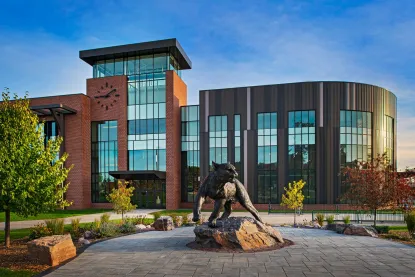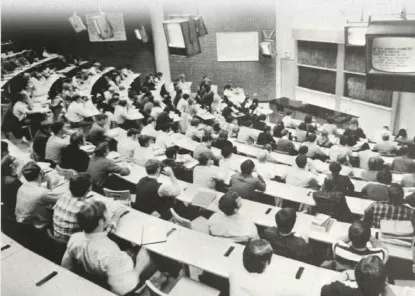
Why a Bachelor's Degree in Social Work at NMU?
The Baccalaureate Social Work degree opens pathways into child protective services, juvenile probation, substance abuse treatment, elder care, and other professional arenas. Graduates qualify for licensure across the United States. Beyond immediate professional practice, many BSW holders pursue advanced credentials like the Master of Social Work, extending their reach and sharpening their analytical tools for systems-level intervention.
- Learn and work alongside respected clinicians, policy analysts, and community organizers
- Hands-on and research-based curriculum
- Continue shaping your worldview in environments specific to both urbanized and rural areas
- Integration into a vibrant community with current students and faculty
- Career growth and smooth transition through our Master of Social Work (MSW) program

Interdisciplinary Curriculum
The Social Work curriculum strategically integrates insights and perspectives from the disciplines of psychology, sociology, biology, humanities, and other sciences, establishing an interdisciplinary foundation for practice. Faculty draw from their own expertise to build on this using a person-in-environment approach, teaching and guiding students to be critical about how individual lives intersect with each other and larger systems while developing core social work skills.

Unique Environment
Marquette and the surrounding Upper Peninsula region provide unique settings for Social Work education. Here, students encounter scenarios that rarely appear in textbooks such as rural health systems, tribal communities, mining heritage towns, and unique environmental concerns. The geography itself becomes a method that shapes students perspectives and ways of knowing. Students can expect to interrogate how isolation shapes access to care, harsh winters test service delivery models, and close-knit communities reveal both resilience and the complications of practicing where everyone may know your name. This geography provides a praxis that demands students to respond critically and generate creative, context-responsive social work that prepares graduates for complexity anywhere.

Five Decades of Preparing Change Agents
Since 1974, NMU's Baccalaureate Social Work program has held continuous accreditation from the Council on Social Work Education, making it one of the longest-standing programs in the region. For five decades, it has prepared practitioners who understand that serving others means interrogating systems, not just responding to their effects. The program builds both technical skill and critical consciousness, equipping graduates to work within institutions while recognizing when those institutions require transformation. View the NMU BSW program's latest Learning Outcomes Report.
BSW Resources and Information
Emergency Services Guidelines and Protocols (If this is an emergency or you are in crisis, please dial 911)
NMU Recreation - Fitness and Wellness (PEIF)
Social Work - Undergraduate Courses
- SW 100 Exploring Social Work
- SW 208 Methods of Social Research I
- SW 230 Human Behavior in the Social Environment I
- SW 272 Basic Crisis Intervention Skills
- SW 283 Tribal-Centered Victim Services
- SW 308 Methods of Social Research II
- SW 331 Human Behavior in the Social Environment II
- SW 341 Social Welfare Policy
- SW 345 Comparing Global Approaches to Social Protection and Social Development
- SW 370 Generalist Practice Methods I
- SW 371 Apprenticeship
- SW 372 Generalist Practice Methods II
- SW 401 Child Welfare
- SW 405 Aging Public Policies and Programs
- SW 411 Social Work in the Health Fields
- SW 413 Social Work with Families
- SW 415 Addictions: Diagnosis, Treatment and Prevention
- SW 417 Social Work in Mental Health
- SW 440 Social Work Policy Analysis
- SW 472 Social Work Practice with Diverse Populations
- SW 473 Integrative Seminar I
- SW 474 Integrative Seminar II
- SW 480 Senior Field Placement I
- SW 481 Senior Field Placement II
- SW 483 Teaching and Research Assistant
- SW 495 Special Topics in Social Work
- SW 498 Directed Study in Social Work
Social work licensure has been in effect in Michigan since July1, 2005. Although obtaining a social work license is required for many social work jobs, it is not a universal requirement by any means. Health care settings, community mental health and organizations that rely on Medicaid or third party reimbursement are more likely to require staff be licensed.One of the key issues is obtaining supervised experience. Normally, you must have MSW supervision through your employer or arrange your own supervision by a licensed MSW social worker in order for experience to qualify. In Michigan, Licensing and Regulatory Affairs (LARA) is responsible for most professional occupation licensing. You can obtain an application packet and other information from their website.
Licensed Bachelor’s Social Worker (LBSW)
Application Criteria
Public Act 61 requires an applicant for licensure as a Licensed Bachelor’s Social Worker to have:
- A bachelor’s degree in social work from an accredited social work program.
- Completed at least two years of full-time post bachelor’s degree experience, or the equivalent in part-time hours, in the practice of social work at the bachelor’s level under the supervision of a licensed master’s social worker. (Until July 1, 2008, the supervision can be done by a person with a master’s or doctoral degree in social work from a college or university school of social work).
The Administrative Rules clarify that the work experience must consist of at least 4,000 hours accrued over not less than two years.
The Rules also require LBSW applicants to pass the Basic or Bachelor’s exam given by the Association of Social Work Boards (ASWB). The passing grade is 75. (Note: For exam information: See http://www.aswb.org/ or call the Association of Social Work Boards at 800-225-6880 for additional information and exam preparation materials. Another source of examination preparation material is Social Work Examination Services, 800-933-8802, www.swes.net. )
Scope of Practice
The Act defines the scope of practice at the bachelor’s level as including all of the following, applied within the scope of social work values, ethics, principles, and skills:
- Applying social work theory, knowledge, methods, and ethics to restore or enhance social, psychosocial, or bio-psycho-social functioning of individuals, couples, families, groups, organizations, or communities with particular attention to the person-in-environment configuration.
- Social work case management and casework, including assessments, planning, referral, and intervention with individuals, families, couples, groups, communities, or organizations within the context of social work values, ethics, principles, and skills
- Helping communities, organizations, individuals, or groups improve their social or health services by using social work practice skills
- Administering assessment checklists that do not require special training or interpretation
A person who performs one or more of these functions, but not all of them, will not be considered engaged in the practice of social work at the bachelor’s level.
The practice does not include the practice of medicine or osteopathic medicine and surgery, including prescribing drugs or administering electroconvulsive therapy; the practice of psychotherapy and other advanced clinical skills specified in the master’s level scope of practice; or the administration or interpretation of psychological tests except as described in the bachelor’s scope of practice.
Qualifying Work Experience – Functions
Qualifying work experience for the LBSW would include, but not be limited to, any of the following:
- Social casework assessment, planning, and intervention with individuals, couples, families, or groups to enhance or restore the capacity for social functioning.
- Case management of health and human services.
- Providing information about and referring individuals to resources.
- Planning and collaborating with communities, organizations, or groups to improve their social or health services.
- Working with clients in accessing, coordinating, or developing resources to develop solutions for interpersonal or community problems.
Note: For supervision and other requirements concerning qualifying work experience for LBSWs see “Qualifying Work Experience – General Requirements: LMSWs, LBSWs, SSTs” at this website
The undergraduate social work program at NMU has been continuously accredited by the Council on Social Work Education (CSWE) since 1974. Accreditation was last reaffirmed in 2013. A program review for reaffirmation of accreditation is expected to be completed in 2021. The BSW Program self-study report can be accessed here in a three volume set:
- BSW Program Self-Study Vol I Report
- BSW Program Self-Study Vol II Program Course Syllabi
- BSW Program Self-Study Vol III Supporting Documents (includes field manual and department by-laws)
- CSWE Competency Reporting Form 2012
- CSWE Competency Reporting Form 2014
- CSWE Competency Reporting Form 2016
Why accreditation is important:
| 1. | National Standards of Program Quality: The social work program conforms to requirements for program academic content, field instruction, and program operation. Accreditation requires that programs not only have minimum faculty and support resources but that they have a well designed curriculum which prepares graduates for generalist professional practice. Accreditation requires that programs continuously monitor and evaluate themselves for program quality. It also requires that programs adhere to standards of nondiscrimination and provide opportunity for student involvement in governance. Complete information on accreditation standards is available from the Council on Social Work Education. |
| 2. | Enhanced Employment Opportunities: CSWE accredited status is beneficial for employment for the following reasons: a) The accredited BSW degree is preferred by many employers in the human services; b) It is required for some jobs, especially where third party payment by insurance providers is involved, and c) it is necessary for licensure as a social worker in many states with social work licensure. |
| 3. | Graduate Education: CSWE-accredited status is beneficial for obtaining advanced standing in Master in Social Work Programs throughout the nation. Although one may gain admission to an MSW program with other undergraduate degrees, completing the program would normally require approximately 60-credit hours over two academic years. CSWE-accredited BSW grads may often complete an MSW in one calendar year with about 45 credits. In addition, our graduates often test out of several required courses, enabling them to expand their educational experience with electives. Advanced standing policies vary from school to school. For more information, the Council on Social Work Education web site provides links to all accredited MSW programs. |
To see which license the BSW program prepares you for by state, visit our Licensure Disclosure.
The Council on Social Work Education requires a minimum of 400 clock hours of field instruction for a BSW degree.
- NMU requires 8 credit hours of field instruction: SW 480 (4 credits) and SW 481 (4 credits). Usually, this translates into about 15 hours per week for 30 weeks during the senior year for a total of 450 hours. A minimum of 400 hours is required for a passing grade.
- Field Instructors should have either an MSW Degree or a BSW degree with experience. Exceptions can be made with additional supervision provided by NMU faculty.
- Only students who have been admitted to the advanced BSW curriculum and who have a GPA of at least 2.5 are eligible for placement.
- The NMU Field Coordinator arranges prospective placements between the student and the agency. Field agencies interview each prospective student (typically in April) before the placement is approved for the following Fall.
- Each student prepares a learning agreement with assistance from the field instructor; this learning agreement operationalizes how the student will address CSWE competencies during field placement. The learning agreement is reviewed and revised each term.
- Field students are concurrently enrolled in a seminar while in placement.
- An NMU faculty member is the instructor of record and serves as the NMU liaison with the agency field instructor.
- Students provide a weekly log of activities to their Field Instructor and the Field Placement Coordinator to document hours.
- The field instructor completes a rating form each semester as part of the student evaluation process assessing competency development
- Students also complete a self-assessment each term of their competency development.
- Field placement is graded on a Satisfactory/Unsatisfactory basis. The NMU faculty liaison is responsible for assigning the semester grade.
- Download the Field Manual here
For more information, please contact:
Ann Crandell-Williams, Field Coordinator
Northern Michigan University
1401 Presque Isle Avenue
Marquette, MI 49855
Email: acrandel@nmu.edu
Beginning Stage: Foundations of Social Work
This component includes the following courses:
- SW 100 Exploring Social Work
- SW 230 Human Behavior and Social Environment I
The overall goal of this component is for students to come away with a clear concept of the profession of social work, especially generalist practice. Students explore their own values and competencies in comparison to the expectations of the profession and decide if a profession in social work is their goal. SW 100 provides an overview of the profession, and lays a foundation for the entire curriculum. It provides an overview of social work practice settings and includes a volunteer experience. SW 230 introduces students to the systems approach for organizing knowledge about people and their social environments.
Upon completion of this component, the following will have been accomplished:
- The student has been exposed to the core social work competencies, generalist practice and how the Social Work curriculum prepares them to enter generalist practice.
- The student will have assessed personal values, strengths, weaknesses, and goals for professional growth.
Middle Stage: Building the Knowledge and Skills for Generalist Practice
This component includes the following courses:
- SW 331 Human Behavior and Social Environment
- SW 341 Social Welfare Policy
- SW 308 Research Methods II
The goal of this component is to provide more in-depth coverage of social work core competencies. Upon completion of this section of the curriculum students will:
- Have a more in-depth understanding of the core social work competencies and the NASW Code of Ethics.
- Have applied competencies in classroom activities, course assignments and exams.
- Show a level of intellectual, psychological and emotional maturity to suggest readiness for Upper Level Curriculum Courses.
SW 341 focuses on social welfare policies that influence human well-being. SW 308 provides students with skills on how to engage in practice-based research and research-based practice. SW 331 Human Behavior in the Social Environment II is the second course in the HBSE series, focusing on the influence of developmental stages on behavior.
Final Stage: Social Work Competencies Action
Junior-standing Social Work majors (those with 56-87 credits) must apply to the Upper Level Curriculum by October 1 of the junior year. Only majors who have applied and been accepted can move on to the Upper Level Practice sequence that begins in the Winter semester and progress to the Senior year Field Placement. Students should seek advising support to ensure they apply at the right time in their curriculum.
The following criteria are required for admission to the Upper Level sequence:
- Have completed SW 100 and SW 230 by the end of the current (Fall) Semester.
- Have completed at least 5 of 7 Human Behavior Cluster Courses by the end of the Fall semester
- Have a GPA of 2.50 or higher in Social Work and Human Behavior Cluster classes (transfer credits will be hand calculated with a student's NMU GPA)
- Students should be emotionally and physically prepared for the rigors of the upper level sequence
- Students must demonstrate conduct becoming of a Social Worker in courses, the community, and any volunteering or practice experience
The application is located online and can be accessed by clicking HERE. Completing the online application is highly recommended, but a paper copy can also be picked up in the Social Work office at 2400 Jamrich Hall, or can be obtained by emailing Ann Crandell-Williams, BSW Program Director, at acrandel@nmu.edu. Completed and signed applications are due by October 1 of the fall semester of the Junior year.
The Upper Level Curriculum Practice Sequence includes the following courses:
- SW 370 Practice Methods I
- SW 372 Practice methods II
- SW 440 Social Welfare Policy Analysis
- SW 473 Integrative Seminar I
- SW 474 Integrative Seminar II
- SW 472 Anti-Oppressive Social Work Practice
- SW 480 Field Placement I
- SW 481 Field Placement II
This stage is made up of a sequence of courses that occur over the final three semesters of the program. Prerequisites must be completed before entry and each of these courses is completed concurrently with field placement. The primary goal of this stage is to integrate the values, ethics, and competencies learned in previous courses with skills practice. SW 370 covers direct practice methods with individuals, families, and groups, and SW 372 focuses on macro practice methods with organizations and communities. SW 472 emphasizes strategies for culturally competent practice and empowering minoritized and oppressed populations. SW 473 and SW 474 emphasize issues of social work professionalism and serve as a forum for processing field practice experiences. Policy is integrated with practice in SW 440. Building on SW 341, the course focuses the student's attention on policy issues in the field and the role of policy in advocating for human rights and social and economic justice. SW 480 and SW 481 provide 30 weeks of field practicum in which the student completes tasks within the placement to demonstrate mastery of social work competencies. Field placement is where students apply generalist practice knowledge, values and skills in an actual social work setting.
Interested in having your work or projects published? Below are common journals for student publishing.
Student-focused journals:
Conspectus Borealis (NMU's undergraduate and interdisciplinary journal for scholary and creative works)
Currents: Scholarship in the Human Services publishes undergraduate and graduate student research, case studies, and program evaluations across social work and human services.
Journal of Baccalaureate Social Work includes student-authored pieces alongside faculty work, focusing on BSW-level education and practice.
The Social Work Practitioner-Researcher welcomes contributions from students conducting field-based research and practice evaluations.
Journals with student sections:
Affilia: Journal of Women and Social Work occasionally features graduate student research, particularly work examining gender, intersectionality, and social justice.
Journal of Social Work Education publishes some student scholarship, especially pieces analyzing educational methods or field experiences.
Critical Social Work accepts student submissions focused on critical perspectives, anti-oppressive practice, and structural analysis.
Regional and specialty options:
Advances in Social Work from Indiana University has published student work on various practice and policy topics.
The New Social Worker includes student voices and often features shorter pieces suitable for emerging scholars.
Reflections: Narratives of Professional Helping welcomes student narratives and reflective pieces about practice experiences.
Many schools also have their own student journals. Northern Mich
